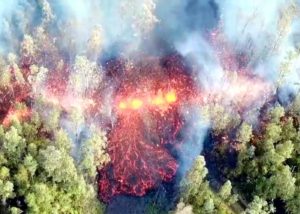Should you really travel to the Big Island of Hawaii?
WHAT YOU NEED TO KNOW
• There is absolutely no reason at this time for travelers to change or alter their leisure or business plans.
• All of the Hawaiian Islands are unaffected by Kilauea volcano except a remote area on the island of Hawaii’s east side. Out of the island’s 4,028 square miles, only less than a 10-square-mile area of Leilani Estates and Lanipuna Gardens Subdivisions in Puna is affected.
• Air Access: All flights into the Ellison Onizuka Kona International Airport at Keahole – KOA (west) and Hilo International Airport – ITO (east) are operating normally.
• Accommodations and Activities: All accommodations, activities and attractions on the island are also operating normally, with the exception of those in the area affected by the lava activity.
• Air Quality: The clean and safe air quality on the island of Hawaii remains largely unchanged with this situation. However, air quality near where the lava is flowing can be hazardous (SO2-sulfur dioxide), which is why officials are keeping people out of the affected areas and continuing to monitor air quality.
The Executive Director of the Island of Hawaii Visitors Bureau, Ross Birch, issued the following statement and information:
As news of volcanic activity taking place in East Hawaii continues to make headlines around the world, it is important that travelers headed to the island of Hawaii understand that there is absolutely no reason at this time to change or alter your leisure or business plans.
AIRPORTS, ACCOMMODATIONS & ACTIVITIES
• All airports on the island of Hawaii continue to operate normally.
• All accommodations, activities and attractions on the island are also operating normally, with the exception of those in the area affected by the lava activity.
• Visitors who have already booked a trip to the island of Hawaii with accommodations or activities on the east side, should call their provider with any questions or concerns.
ERUPTION LOCATION
• The volcanic activity and where lava has flowed is limited to an isolated area in lower Puna on the island’s east side.
• This is more than 100 miles away from the western Kohala and Kona Coasts, where the island’s major visitor accommodations and resorts are located. This is the area furthest from the current activity.
• Kilauea is one of the most active volcanoes on Earth and has been erupting for the past 35 years.
• The topography of the island between east and west is unconducive for a natural flow.
• Out of the island’s 4,028 square miles, only less than a 10-square-mile area of Leilani Estates and Lanipuna Gardens Subdivisions in the district of Puna is affected.
Hawaii County Civil Defense Eruption Map
AIR QUALITY
The clean and safe air quality on the island of Hawaii remains unchanged with this situation. However, air quality near active eruption sites can be hazardous (SO2-sulfur dioxide), which is why officials are keeping people out of the outbreak areas and continue to monitor air quality at the active eruption site. To view real-time air quality conditions around the island, click here.
HAWAII VOLCANOES NATIONAL PARK
On May 6, Hawaii Volcanoes National Park reopened partially with limited services. The following areas are open:
• The Park’s Entrance Station from Mamalahoa Highway (Route 11) to Jaggar Museum is open from 3:00 p.m. to 10:00 p.m.; Jaggar Museum will close at 8:00 p.m. (the outdoor overlook will remain open until 10:00 p.m.)
• Kilauea Visitor Center is open from 3:00 p.m. to 8:00 p.m.
• Sulphur Banks Trail
• Steam Vents parking lot
• Crater Rim Trail is open from Kilauea Overlook to Jaggar Museum only
• The Entrance Station to the 1969 lava flow near Maunaulu
• Maunaulu to Puuhuluhulu (Napau Trail is closed past Puuhuluhulu)
• Escape Road from Highway 11 to Maunaulu
• Maunaloa Road from Highway 11 to the Maunaloa Lookout and Kipukapuaulu
• The no-fly zone over Kilauea remains
For Hawaii Volcanoes National Park updates, click here.
ACCESSIBILITY IN EAST HAWAII
• As active volcanic vents are erupting in the area, all residents of Leilani Estates and Lanipuna Gardens Subdivisions are required to evacuate.
• Pohoiki Road is closed from the intersection at Highway 132 down to Highway 137 to allow evacuation efforts of residents in Leilani Estates and Lanipuna Gardens Subdivisions to proceed whenever possible.
• Residents and visitors who do not have official business in the active evacuation area (Leilani Estates and Lanipuna Gardens Subdivisions) are asked to stay away to keep the roads as clear as possible and allow homeowners to evacuate.
• Temporary flight restrictions are in place for most of lower Puna. Drones will be confiscated in this area.
• Those who have rented accommodations or made tour reservations in the general area should check with those respective companies for the latest updates.
• Unless otherwise noted, area businesses are open and accessible. Motorists are advised to drive with caution and be prepared for increased traffic.
• Department of Land and Natural Resources (DLNR) Division of State Parks has closed Lava Tree State Monument and Mackenzie State Recreation Area until further notice.
• As a safety precaution, the County of Hawaii has closed the Kalapana Viewing Area until further notice.
VOLCANOES IN HAWAII
Eruptions of Hawaiian volcanoes are typically nonexplosive or weakly explosive. Hawaiian eruptions, which is a term used by volcanologists worldwide to characterize similar eruptive style at other volcanoes, are usually gentle due to its highly fluid lava composition which tends to flow freely both beneath the surface and upon eruption. For more information about Hawaiian eruptions, click here.
Travelers planning a trip to the island of Hawaii who have questions can contact the Hawaii Tourism United States Call Center at 1-800-GOHAWAII (1-800-464-2924).




